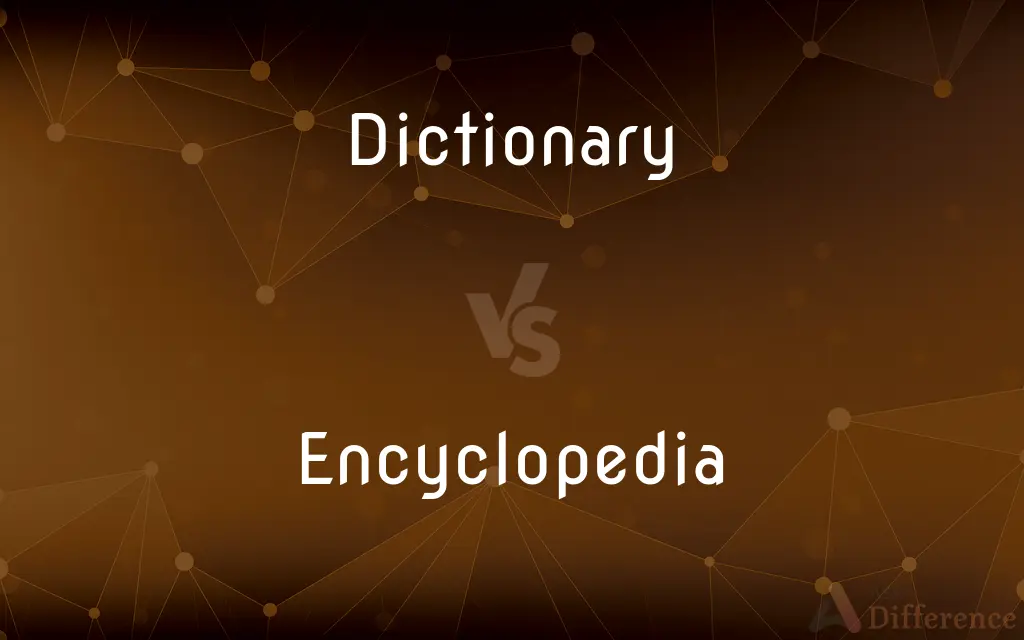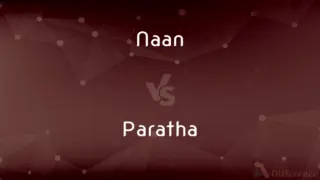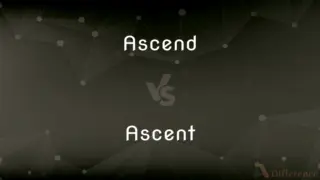Dictionary vs. Encyclopedia — What's the Difference?
By Fiza Rafique & Urooj Arif — Updated on March 13, 2024
A dictionary focuses on word definitions and usage, while an encyclopedia provides detailed information on a wide range of subjects.

Difference Between Dictionary and Encyclopedia
Table of Contents
ADVERTISEMENT
Key Differences
A dictionary is a reference book or online resource that lists words in alphabetical order, providing definitions, pronunciations, and sometimes information on origin and usage. It is primarily used for understanding the meanings of words and how they integrate into language. Encyclopedias, on the other hand, offer in-depth articles on a broad spectrum of topics, including historical events, people, concepts, and places. They aim to give comprehensive information on subjects rather than just focusing on language.
While dictionaries emphasize the linguistic aspects of words, including their parts of speech, synonyms, and antonyms, encyclopedias concentrate on factual and descriptive content about the world. A dictionary entry is succinct, focusing on the word itself, whereas an encyclopedia article is expansive, covering the subject's significance, context, and related facts.
The purpose of a dictionary is to facilitate language comprehension and usage, serving as a tool for writers, students, and anyone looking to clarify word meanings. Encyclopedias serve as educational resources that provide detailed information and background on a wide array of topics, supporting research and learning.
Dictionaries are structured around words and their elements, including etymology, whereas encyclopedias are organized by topics or themes, often incorporating multimedia elements like photographs, diagrams, and maps to complement the text. This structural difference highlights their distinct focuses: linguistic precision versus thematic knowledge.
The target audience for dictionaries and encyclopedias overlaps but also diverges based on needs. Dictionaries are essential for anyone using a language, especially learners, while encyclopedias target those seeking knowledge about specific subjects, making them invaluable to students, researchers, and the curious.
ADVERTISEMENT
Comparison Chart
Focus
Word definitions, usage, pronunciation, and etymology
In-depth information on a wide range of subjects
Content Type
Linguistic
Factual, descriptive
Purpose
To facilitate understanding and use of language
To provide comprehensive information on various topics
Structure
Alphabetical listing of words
Articles on topics organized thematically
Target Audience
Language users, learners
Students, researchers, general knowledge seekers
Compare with Definitions
Dictionary
A reference work on words, providing meanings, pronunciations, and usage.
She looked up the word quintessential in the dictionary to understand its precise meaning.
Encyclopedia
Articles provide detailed information, context, and analysis.
The encyclopedia entry on climate change discusses causes, effects, and mitigation strategies.
Dictionary
Can be specialized, such as legal or medical dictionaries.
The medical dictionary contains terms and definitions specific to healthcare.
Encyclopedia
A comprehensive reference work covering a wide range of subjects.
For his research on Ancient Egypt, he consulted an encyclopedia.
Dictionary
Focused on linguistic details and word functions.
The dictionary entry for run lists its many definitions and parts of speech.
Encyclopedia
Often includes multimedia elements to supplement text.
The online encyclopedia features interactive maps and videos on geographic topics.
Dictionary
Includes information on word origins (etymology).
The dictionary explains that night comes from Old English niht.
Encyclopedia
Can be general or focused on specific fields.
The science encyclopedia covers topics from astronomy to zoology in detail.
Dictionary
Often used for language learning and improvement.
Language learners use a dictionary daily to expand their vocabulary.
Encyclopedia
Aimed at a broader understanding of complex topics.
The encyclopedia offers insights into the cultural significance of rituals across societies.
Dictionary
A dictionary is a listing of lexemes from the lexicon of one or more specific languages, often arranged alphabetically (or by radical and stroke for ideographic languages), which may include information on definitions, usage, etymologies, pronunciations, translation, etc.. It is a lexicographical reference that shows inter-relationships among the data.A broad distinction is made between general and specialized dictionaries.
Encyclopedia
An encyclopedia (American English), encyclopædia, or encyclopaedia (British English) is a reference work or compendium providing summaries of knowledge either from all branches or from a particular field or discipline. Encyclopedias are divided into articles or entries that are often arranged alphabetically by article name and sometimes by thematic categories.
Dictionary
A book or electronic resource that lists the words of a language (typically in alphabetical order) and gives their meaning, or gives the equivalent words in a different language, often also providing information about pronunciation, origin, and usage
I'll look up 'love' in the dictionary
The dictionary definition of ‘smile’
The website gives access to an online dictionary
Encyclopedia
A comprehensive reference work containing articles on a wide range of subjects or on numerous aspects of a particular field, usually arranged alphabetically.
Dictionary
A reference work containing an alphabetical list of words, with information given for each word, usually including meaning, pronunciation, and etymology.
Encyclopedia
A comprehensive reference work (often spanning several printed volumes) with articles (usually arranged in alphabetical order, or sometimes arranged by category) on a range of subjects, sometimes general, sometimes limited to a particular field.
I only use the library for the encyclopedia, as we’ve got most other books here.
His life's work is a four-volume encyclopedia of aviation topics.
Dictionary
A reference work containing an alphabetical list of words in one language with their translations in another language.
Encyclopedia
(dated) The circle of arts and sciences; a comprehensive summary of knowledge, or of a branch of knowledge.
Dictionary
A reference work containing an alphabetical list of words in a particular category or subject with specialized information about them
A medical dictionary.
Encyclopedia
The circle of arts and sciences; a comprehensive summary of knowledge, or of a branch of knowledge; esp., a work in which the various branches of science or art are discussed separately, and usually in alphabetical order; a cyclopedia.
Dictionary
A list of words stored in machine-readable form for reference, as by spelling-checking software.
Encyclopedia
A reference work (often in several volumes) containing articles on various topics (often arranged in alphabetical order) dealing with the entire range of human knowledge or with some particular specialty
Dictionary
A reference work with a list of words from one or more languages, normally ordered alphabetically, explaining each word's meanings (sense), and sometimes also containing information on its etymology, pronunciation, usage, semantic relations, and translations, as well as other data.
If you want to know the meaning of a word, look it up in the dictionary.
Dictionary
A synchronic dictionary of a standardised language held to only contain words that are properly part of the language.
Dictionary
(by extension) Any work that has a list of material organized alphabetically; e.g., biographical dictionary, encyclopedic dictionary.
Dictionary
(computing) An associative array, a data structure where each value is referenced by a particular key, analogous to words and definitions in a dictionary (sense 1).
Hash table
Dictionary
(transitive) To look up in a dictionary.
Dictionary
(transitive) To add to a dictionary.
Dictionary
To compile a dictionary.
Dictionary
A book containing the words of a language, arranged alphabetically, with explanations of their meanings; a lexicon; a vocabulary; a wordbook.
I applied myself to the perusal of our writers; and noting whatever might be of use to ascertain or illustrate any word or phrase, accumulated in time the materials of a dictionary.
Dictionary
Hence, a book containing the words belonging to any system or province of knowledge, arranged alphabetically; as, a dictionary of medicine or of botany; a biographical dictionary.
Dictionary
A reference book containing an alphabetical list of words with information about them
Common Curiosities
Do online dictionaries and encyclopedias differ from their printed versions?
Online versions may offer more up-to-date information and interactive features, but the core purposes of both dictionaries and encyclopedias remain consistent across formats.
Are encyclopedias useful for language learning?
Encyclopedias are more suited for gaining knowledge on subjects than for language learning, which is the primary focus of dictionaries.
What is the main purpose of a dictionary?
A dictionary aims to define words, provide pronunciation guides, and offer information on usage and etymology.
How does an encyclopedia differ from a dictionary?
An encyclopedia provides detailed articles on a wide array of subjects for educational purposes, unlike a dictionary, which focuses on word meanings and language use.
How are new words added to a dictionary?
New words are added based on widespread and sustained use in language, evidenced by published texts and media.
Are there digital encyclopedias that cover niche subjects?
Yes, there are digital encyclopedias focusing on specific fields, such as technology, history, or science, offering depth in those areas.
Can dictionaries include information on topics?
While dictionaries may provide brief notes on word origins or usage contexts, they do not offer the in-depth topic exploration found in encyclopedias.
Can encyclopedias be biased?
While encyclopedias strive for neutrality, the choice of topics and perspectives can introduce bias; hence, cross-referencing with multiple sources is advised.
Do dictionaries explain how to use words in sentences?
Many dictionaries provide example sentences to illustrate word usage, aiding in understanding and application.
How often are dictionaries and encyclopedias updated?
Print versions may be updated every few years, while online versions can be updated more frequently to reflect new information or language changes.
Share Your Discovery

Previous Comparison
Naan vs. Paratha
Next Comparison
Ascend vs. AscentAuthor Spotlight
Written by
Fiza RafiqueFiza Rafique is a skilled content writer at AskDifference.com, where she meticulously refines and enhances written pieces. Drawing from her vast editorial expertise, Fiza ensures clarity, accuracy, and precision in every article. Passionate about language, she continually seeks to elevate the quality of content for readers worldwide.
Co-written by
Urooj ArifUrooj is a skilled content writer at Ask Difference, known for her exceptional ability to simplify complex topics into engaging and informative content. With a passion for research and a flair for clear, concise writing, she consistently delivers articles that resonate with our diverse audience.














































